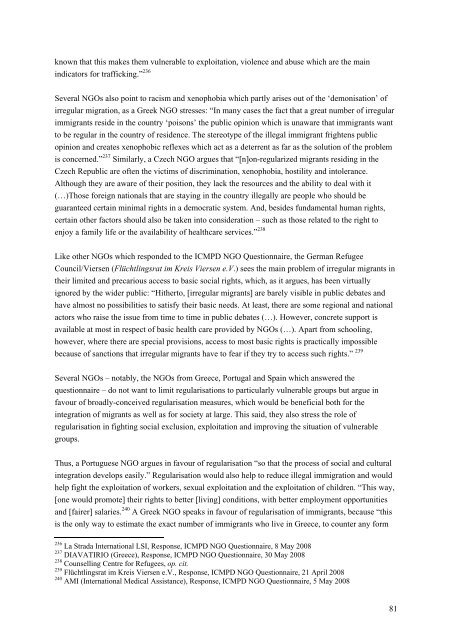REGINE Regularisations in Europe Final Report - European ...
REGINE Regularisations in Europe Final Report - European ...
REGINE Regularisations in Europe Final Report - European ...
You also want an ePaper? Increase the reach of your titles
YUMPU automatically turns print PDFs into web optimized ePapers that Google loves.
known that this makes them vulnerable to exploitation, violence and abuse which are the ma<strong>in</strong><br />
<strong>in</strong>dicators for traffick<strong>in</strong>g.” 236<br />
Several NGOs also po<strong>in</strong>t to racism and xenophobia which partly arises out of the ‘demonisation’ of<br />
irregular migration, as a Greek NGO stresses: “In many cases the fact that a great number of irregular<br />
immigrants reside <strong>in</strong> the country ‘poisons’ the public op<strong>in</strong>ion which is unaware that immigrants want<br />
to be regular <strong>in</strong> the country of residence. The stereotype of the illegal immigrant frightens public<br />
op<strong>in</strong>ion and creates xenophobic reflexes which act as a deterrent as far as the solution of the problem<br />
is concerned.” 237 Similarly, a Czech NGO argues that “[n]on-regularized migrants resid<strong>in</strong>g <strong>in</strong> the<br />
Czech Republic are often the victims of discrim<strong>in</strong>ation, xenophobia, hostility and <strong>in</strong>tolerance.<br />
Although they are aware of their position, they lack the resources and the ability to deal with it<br />
(…)Those foreign nationals that are stay<strong>in</strong>g <strong>in</strong> the country illegally are people who should be<br />
guaranteed certa<strong>in</strong> m<strong>in</strong>imal rights <strong>in</strong> a democratic system. And, besides fundamental human rights,<br />
certa<strong>in</strong> other factors should also be taken <strong>in</strong>to consideration – such as those related to the right to<br />
enjoy a family life or the availability of healthcare services.” 238<br />
Like other NGOs which responded to the ICMPD NGO Questionnaire, the German Refugee<br />
Council/Viersen (Flüchtl<strong>in</strong>gsrat im Kreis Viersen e.V.) sees the ma<strong>in</strong> problem of irregular migrants <strong>in</strong><br />
their limited and precarious access to basic social rights, which, as it argues, has been virtually<br />
ignored by the wider public: “Hitherto, [irregular migrants] are barely visible <strong>in</strong> public debates and<br />
have almost no possibilities to satisfy their basic needs. At least, there are some regional and national<br />
actors who raise the issue from time to time <strong>in</strong> public debates (…). However, concrete support is<br />
available at most <strong>in</strong> respect of basic health care provided by NGOs (…). Apart from school<strong>in</strong>g,<br />
however, where there are special provisions, access to most basic rights is practically impossible<br />
because of sanctions that irregular migrants have to fear if they try to access such rights.” 239<br />
Several NGOs – notably, the NGOs from Greece, Portugal and Spa<strong>in</strong> which answered the<br />
questionnaire – do not want to limit regularisations to particularly vulnerable groups but argue <strong>in</strong><br />
favour of broadly-conceived regularisation measures, which would be beneficial both for the<br />
<strong>in</strong>tegration of migrants as well as for society at large. This said, they also stress the role of<br />
regularisation <strong>in</strong> fight<strong>in</strong>g social exclusion, exploitation and improv<strong>in</strong>g the situation of vulnerable<br />
groups.<br />
Thus, a Portuguese NGO argues <strong>in</strong> favour of regularisation “so that the process of social and cultural<br />
<strong>in</strong>tegration develops easily.” Regularisation would also help to reduce illegal immigration and would<br />
help fight the exploitation of workers, sexual exploitation and the exploitation of children. “This way,<br />
[one would promote] their rights to better [liv<strong>in</strong>g] conditions, with better employment opportunities<br />
and [fairer] salaries. 240 A Greek NGO speaks <strong>in</strong> favour of regularisation of immigrants, because “this<br />
is the only way to estimate the exact number of immigrants who live <strong>in</strong> Greece, to counter any form<br />
236 La Strada International LSI, Response, ICMPD NGO Questionnaire, 8 May 2008<br />
237 DIAVATIRIO (Greece), Response, ICMPD NGO Questionnaire, 30 May 2008<br />
238 Counsell<strong>in</strong>g Centre for Refugees, op. cit.<br />
239 Flüchtl<strong>in</strong>gsrat im Kreis Viersen e.V., Response, ICMPD NGO Questionnaire, 21 April 2008<br />
240 AMI (International Medical Assistance), Response, ICMPD NGO Questionnaire, 5 May 2008<br />
81
















